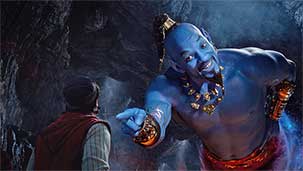I have to be honest, I didn’t notice your work in Aladdin. But I suppose that’s the point. Your prosthetic teeth shouldn’t stand out unless they’re supposed to (see; your work on Bohemian Rhapsody). It’s not about how well you did your job (your lengthy IMDb page reflects your expertise), it’s about how Aladdin stands out in all the ways it shouldn’t.
At this point it’s futile to bemoan Disney re-imagining their own properties as live-action features. It’s happening, and there’s nothing we can do about it. The update of The Lion King is already making fans salivate in anticipation of its July release. Aside from its dream cast, it has Jon Favreau at the helm, who proved with his live-action remake of The Jungle Book, that he understands how to take what fans loved about the original and amplify it with exceptional CGI world-building and character development
I suppose it’s just as futile to compare an as-yet-to-be-released film to Aladdin, but the timing – so close to The Lion King’s release – feels like the most cynical of cash-grabs. Especially because instead of using the live-action format to elevate or expand on the original, this version of Aladdin constantly reminds us why it worked better in animated form, making the whole enterprise feel like an afterthought.
It would be too easy to compare Will Smith’s casting of the Genie to the legendary portrayal by Robin Williams in the 1992 animated Aladdin. It’s unfair to lay the blame for Aladdin’s forced-fun spectacle on Will Smith’s blue shoulders. Just as you’re known in Hollywood as the guy to see when you need some false movie teeth, Robin Williams was the guy to see if you wanted to appeal to all demographics and make them laugh so hard they peed themselves a little. It’s not that Will Smith doesn’t have a similar demo appeal, it’s that animation was the perfect medium to capture the frenetic, stream-of-consciousness hilarity that was Robin’s forte. His Genie was so larger than life, that we could actually forget it was Robin. We never forget that Will Smith is Will Smith Playing a Genie. And willing suspension of disbelief is paramount for a story with magic as its entire premise.
Aladdin feels like a gold and diamond encrusted grill snapped over a set of perfect, ivory chompers; an obvious and unnecessary display. Director Guy Ritchie shows off his action chops with an upbeat opening chase sequence which sees Aladdin parkour his way through the streets of the fictional kingdom of Azkabah to take the heat off a beautiful young handmaiden. Of course, this handmaiden is Princess Jasmine incognito, and this version of Aladdin takes pains to portray her as more independent and ambitious than her animated predecessor. Naomi Scott plays Jasmine with steely conviction, and her chemistry with Aladdin’s Mena Massoud is charmingly PG. But their nemesis Jafar is a basic and toothless villain, who isn’t the least bit convincing in his attempt to seize control of Azkabah.
Everything about Aladdin just seems forced and false. From the stagey set design that makes Azkabah’s bazaar look like a Pier 1 Imports warehouse with its roof removed, to the forgettable new song, and Aladdin’s anti-climactic journey to the lackluster Cave of Wonders. The musical sequences suffer from a serious case of more is more, as though packing every inch of the screen with visual whiz-bangery will distract from the padded plot and flat characters. Ritchie, inexplicably, speeds up certain scenes (perhaps he watched too much Benny Hill growing up?) to give them a cartoony feel, which only serves to remind us how this entire two-plus-hours exercise is painfully redundant.
Aladdin isn’t obviously offensive (the non-specific Middle Eastern vibe notwithstanding), and of course, for a kid’s movie, it delivers generic thrills and dazzles in the most gratuitous of ways. But what really grinds my molars is the “character and self-worth are more important than money and power” moral of the story, which seems particularly rich coming from a company whose theme park employees don’t make a living wage while it’s CEO took home $65M in 2018. Sure, the moral was the same in the 1992 version, but that was before Disney became a mass-media monolith, more interested in acquiring wealth than in taking creative chances. And the free market has spoken, with audiences dropping more than $86M to see Aladdin in its opening weekend.
So I suppose my bitching and moaning have something in common with Aladdin, and the dentures you made for Meryl in Iron Lady – all are completely and utterly pointless.
Sincerely,

Di







